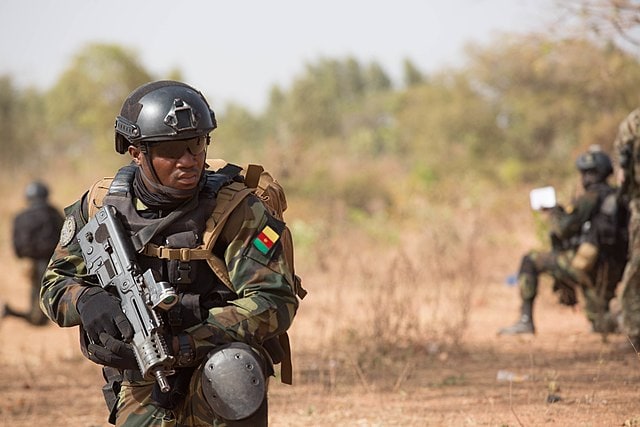The ongoing insurgency in the North-West and South-West regions of Cameroon is undermining the legitimacy of President Biya’s government over the English-speaking population of the country. The Anglophone crisis represents the culmination of the long-standing dispute between the Anglophone regions and the French-speaking majority in Cameroon (source). Violence has spread to ethnic communities and individuals following their cultural identity. More than 6000 people are dead. Over 1 million Cameroonians are displaced, and up to 2 million need assistance (source) (source).
Key Judgement-1: It is highly likely that in the next 12 months, the conflict in the Anglophone region will continue to foster social divisions and threaten the political unity of the country.
Key Judgement-2: It is highly likely that in the next 12 months, the ongoing violence along the Nigerian border will exacerbate the security and the humanitarian situation in the region.
Key Judgement-3: It is highly likely that in the next 12 months, the insurgency will continue to negatively impact Cameroon’s economy, hindering foreign direct investment.
KJ-1: It is highly likely that in the next 12 months, the conflict in the Anglophone region will continue to foster social divisions and threaten the political unity of the country.
a. The disproportionately heavy-handed government response to the 2016 protests by the English-speaking minority triggered support for the armed insurgency (source).
b. Cameroonian security forces have become increasingly more ruthless during their military operations since 2022 (source).
c. For example, in April 2022, government soldiers severely beat and detained around 40 bikers during a funeral convoy under suspicion of being insurgents. 17 of the motorbike riders are still missing (source).
d. Likewise, armed separatists have scaled up the intensity and violence of their attacks. For instance, in order to enforce the ban on government education, attacks on schools, teachers, and pupils are frequent (source).
KJ-2: It is highly likely that in the next 12 months, the ongoing violence along the Nigerian border will exacerbate the security and the humanitarian situation in the region.
a. Separatists and Cameroon soldiers both have crossed the border into Nigeria to conduct strikes in neighbouring villages (source).
b. Indeed, in October 2021, security forces entered the villages of Mairogo and Tosso aiming to find insurgents hiding among Cameroonian refugees. In the following month, armed separatists attacked the border village of Manga (source).
c. More than 87 000 Cameroonians have fled to Nigeria since the start of the conflict (source).
d. The Nun River Basin is historically prone to cross-border conflicts between local communities of crop farmers and cattle herders due to water scarcity and floods (source) (source).
e. For instance, in April 2023, tensions between Nigerian Furlani pastoralists and Cameroonian farmers escalated as 25 people were kidnapped in the North-West region near Nigeria’s Taraba state (source).
KJ-3: It is highly likely that in the next 12 months, the insurgency will continue to negatively impact Cameroon’s economy, hindering foreign direct investment.
a. The conflict between government forces and separatists is destroying the economies of the North-West and South-West regions (Figure 1). For example, in the North-West, tax revenues dropped from almost 500 million Francs in 2016 to just over 600 000 Francs in 2019 (source).
b. Furthermore, before 2016 custom duty collection in Menchum and Donga Mantung (Figure 1) accounted for around 350 million Francs. By 2019, customs duties amounted to 500 000 Francs (source).
c. The Cameroon Development Corporation, the country’s second-largest employer, was driven out of its rubber, palm oil, and banana plantation (source). This threatens the livelihoods of thousands of employees.
d. Other agro-industrial companies including PAMOL have relocated to the safer French-speaking regions or are heavily in debt (source).
e. This implies a sharp decline in investments in the region which increases unemployment and negatively affects living standards. Thus, people of working age have migrated to safer areas impacting local agricultural productivity (source).
f. Access to education remains challenging as more than 54% of the schools in the North-West and South-West have closed due to ongoing violence. Schools in urban areas that received high numbers of displaced people are put under stress (source).
g. The government’s reconstruction plan, launched in 2020 with a budget of $150 million, has stalled due to ongoing clashes between security forces and separatists (source).
Analytical Summary
We are confident in our assessment that the current insurgency is deepening social division and fragmentation along ethnic and cultural lines in Cameroon. This poses a significant danger to the political unity of the country. Furthermore, the legitimacy of the central government is in part undermined by its inability to reassert economic control over the insurgent areas. This weakens President Biya’s war effort as state coffers do not receive revenues from the western regions. Against this backdrop, we are confident that the conflict is contributing to the overall instability and the humanitarian crisis in the wider region.

